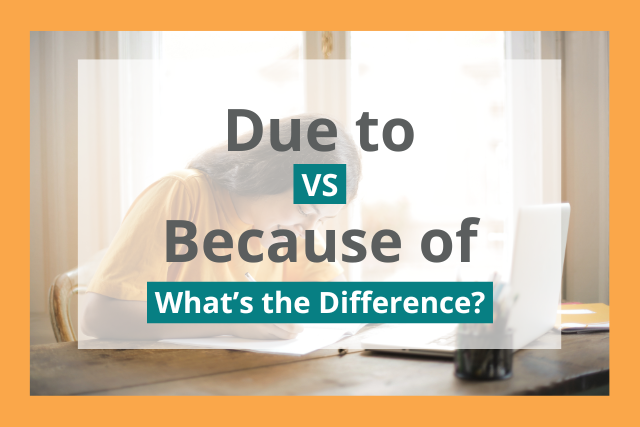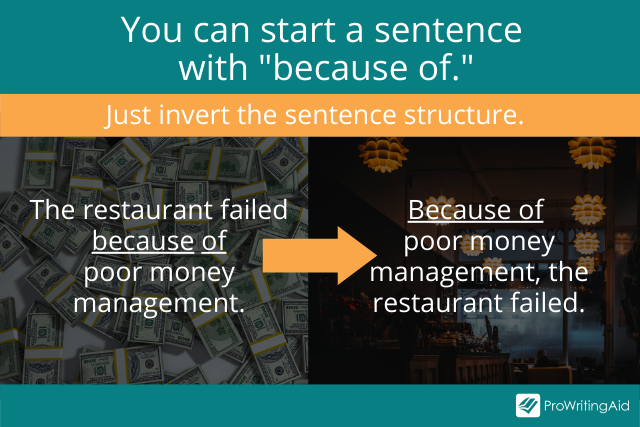
The phrases due to and because of both show a cause-and-effect relationship. However, they are not grammatically equivalent in the English language.
So what exactly is the difference between these two phrases, and why can’t you use them interchangeably?
The short answer is that the phrases because of and due to are different parts of speech, even though they’re both prepositional phrases.
Because of functions as an adverb, which we use to modify verbs, so it should only come after a verb. Due to functions as an adjective, which we use to modify nouns, so it should only come after a noun.
This article will explain the full difference between due to vs because of and help you remember when to use each phrase.
What’s the Difference Between Due to vs Because of?
Both due to and because of present reasons for something to be true. The real difference is that due to should be used to present a reason for a noun, while the phrase because of should be used to present a reason for a verb or an adjective.
You must decide whether you are modifying a noun, verb, or adjective to determine which phrase to use. In the following example, it is the noun growth that’s being modified:
- The tree’s growth is due to nutrient-rich soil.
We can restructure the sentence to use a verb phrase. In the following example, it is the verb grows that’s being modified:
- The tree grows because of the nutrients in the soil.
Because growth is a noun and grows is a verb, the first sentence needs to use due to while the other needs to use because of.
To understand why this difference exists, we need to take a closer look at the grammatical role each of these phrases plays in a sentence.
Is Because of a Preposition?
The phrase because of is an adverbial prepositional phrase. In other words, because of functions as an adverb in a sentence, and it should be used to modify verbs or adjectives.
Think of some common adverbs you know, like quickly or really. These words are used to provide extra information about a verb or adjective.
For example, you might say “She left quickly” or “He was really handsome.” In these examples, left and handsome are the words being modified.
You can use because of after a verb or verb phrase, just like quickly and really. For example, you might say “She left because of her early curfew” or “He was handsome because of his great skincare routine.”
Is Due to a Preposition?
Due to is a prepositional phrase, just like because of. However, it’s an adjectival prepositional phrase, not an adverbial prepositional phrase. In other words, due to functions like an adjective in a sentence.
Think of some common adjectives you know, like annoying or long. These words are used to provide extra information about a person, place, or thing--in other words, to provide information about a noun entity. For example, you might say “The traffic jam is annoying” or “The delay was long.”
You can use due to after a noun or noun phrase, just like annoying or long. For example, you might say “The traffic jam is due to construction work” or “The delay was due to a miscommunication between the two teams.”
How to Use Due to (with Examples)
Whenever you want to explain the reason for something, and you’ve phrased that thing as a noun, you can use due to between the noun and the reason behind it.
For example, consider the sentence: “My success is due to hard work and perseverance.” In this case, “success” is the noun, and “hard work and perseverance” are the reasons that explain that success.
When an adjective comes after the noun it modifies, you usually need a linking verb, like was or is, between the noun and the adjective. That’s why you’ll often see due to used immediately after a to be verb.
Here are some other examples of how to use due to in a sentence:
- The restaurant’s failure was due to poor money management.
- The smoke in the air was due to a wildfire in the nearby forest.
- The bright yellow color of my homemade soup is due to the turmeric that I add to the recipe.
How to Use Because of (with Examples)
Because of functions the same way as due to, except it should come after a verb or an adjective, instead of a noun.
For example, consider the sentence: “I succeeded because of hard work and perseverance.” In this case, “succeeded” is the verb, and “hard work and perseverance” are the reasons that explain that verb.
Alternatively, you can also use this sentence: “I am successful because of hard work and perseverance.” In this example, “successful” is an adjective being modified.
Here are some other examples of how to use because of in a sentence:
- The restaurant failed because of poor money management.
- The air was smoky because of a wildfire in the nearby forest.
- My homemade soup looks bright yellow because of the turmeric that I add to the recipe.
Can You Start a Sentence with Because of or Due to?
You may have heard the myth that you shouldn’t begin a sentence with a preposition. However, there’s no rule against starting a sentence with a preposition.
As a result, it’s perfectly okay to start a sentence with because of. Just invert the structure of a sentence that has because of in the middle. For example, we can easily invert the examples above:
- Because of poor money management, the restaurant failed.
- Because of a wildfire in the nearby forest, smoke filled the air.
- Because of the turmeric that I add to the recipe, my homemade soup looks bright yellow.

Starting a sentence with due to is much less common, since it needs a noun or pronoun to modify. These sentences sound much more awkward in an inverted form, and require you to phrase them in an unnecessarily wordy way.
If we try to invert our first example from the previous section, we get: “Due to poor money management, the restaurant’s failure was.” This sentence is not technically incorrect, but unless you want to sound like Yoda from Star Wars, it’s safer to avoid using due to at the beginning of a sentence.
Conclusion on the Difference Between Due to vs Because of
Now you know the difference between due to and because of!
These two expressions are often used interchangeably in conversational English, so don’t worry too much about incorrect usage when you’re speaking. And as long as you know whether you’re writing about a noun or a verb, you’ll be able to choose the right words in your writing.
If you’re not sure which one to use, you can always run your writing through ProWritingAid’s Grammar Check, which will ensure that all your sentences are using the correct parts of speech.

